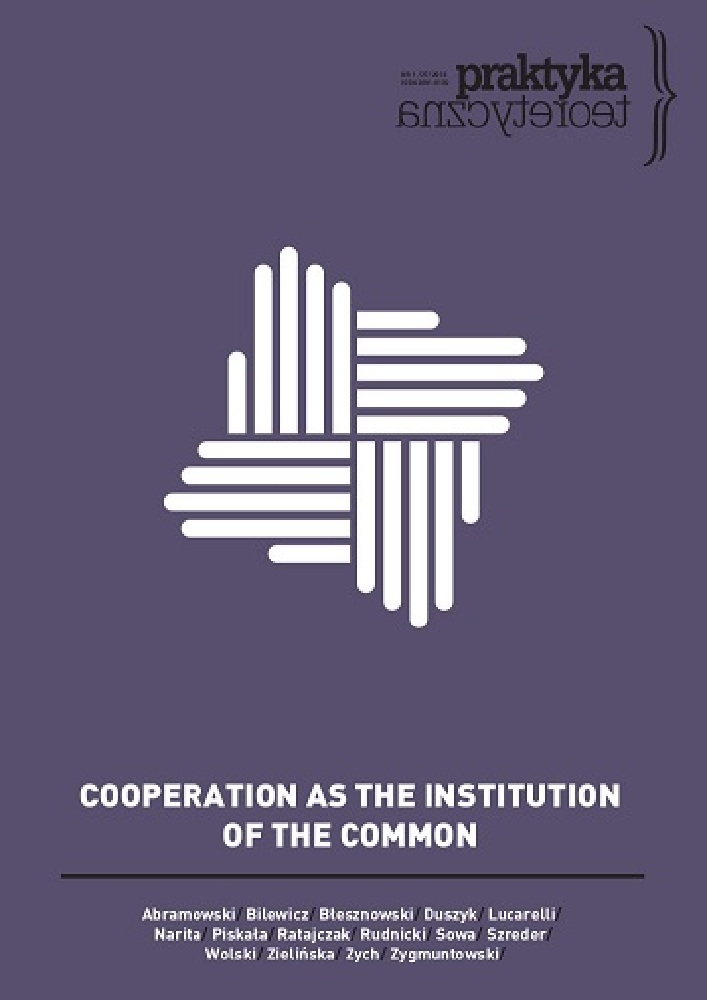Abstract
The essay is a review of Michael Hardt’s and Antonio Negri’s Assembly and it aims at a critical evaluation of its empirical relevance and political usefulness. It focuses on two issues. The first one is general and as such relates to the global context of struggles against capital: the notion of social factory and its implications for political action. The essay argues that the concept of social factory grasped an important development within twentieth century capitalism. It is, however, becoming more and more irrelevant as living labour is being systematically replaced by automation. Unlike the social media or other similar forms of “digital capitalism” analysed in Assembly, a very large part of automation does not depend on any kind of continuous, multitudinous human input. It rather aims at uploading the general intellect into the system of autonomous machines, making them independent from the human element. The second issue this essay examines is the recent populist-conservative turn and the situation of peripheral countries that had no part in the recent progressive cycle of struggles (Arab Spring, Occupy, Indignados). The essay points to a bias in the post-Operaist project – its focus on particular geographical and socio-cultural areas – that ignores the different social and political situations of some peripheral countries, especially those of Central-Eastern Europe.References
Beck, Ulrich. 2000. Brave New World of Work. Cambridge: Polity Press.
Bolognas, Sergio. 1976. “Class composition and the theory of the party at the origin of the workers councils movement.” In CSE Pamphlet no. 1. The Labour Process & Class Strategies. London: Stage 1.
Bookchin, Murray. 1992. Urbanization Without Cities: The Rise and Decline of Citizenship. New York: Black Rose Books.
Dalla Costa, Mariarosa. 1995. “Capitalism and reproduction.” In Open Marxism – vol. 3: Emancipating Marx. Eds. W. Bonefeld, J. Holloway, K. Psychopedis. London–An Arbor: Pluto Press.
Debord, Guy. 2005. Society of the Spectacle. Trans. Ken Knabb. London: AK Press.
Elliott, Larry, and Dan Atkinson. 2012. Going South. Why Britain will have a Third World Economy by 2014. New York: Palgrave Macmillan
Federici, Silvia. 1975. Wages Against Housework. Bristol: Power of Women Collective & the Falling Wall Press.
Fukuyama, Francis. 2007. The End of History and the Last Man. New York: Simon & Shuster.
Graeber, David. 2013. The Democracy Project: A History, A Crisis, A Movement. New York: Spiegel & Grau.
Hardt, Michael, and Antonio Negri. 2009. Commonwealth. Cambridge, Mass.: Harvard University Press.
Hardt, Michael, and Antonio Negri. 2017. Assembly. New York: Oxford University Press.
Hern, Alex. 2018. “Boston Dynamics crosses new threshold with door-opening dog.” The Guardian February 13. https://www.theguardian.com/technology/2018/feb/13/boston-dynamics-spot-mini-door-opening-dog-crosses-threshold.
Kessler, Sarah. 2015. “What Does A Union Look Like In The Gig Economy?” Fast Company February 19. https://www.fastcompany.com/3042081/what-does-a-union-look-like-in-the-gig-economy.
Marx, Karl. 1973. Grundrisse. Foundations of the Critique of Political Economy (Rough Draft). Trans. M. Nicolaus. London: Penguin Books.
Marx, Karl, and Frederick Engels. 2008. Manifesto of the Communist Party. Trans. William Reeves. Utrecht: Open Source Socialist Publishing.
Moravec, Hans. 1988. Mind Children. Boston: Harvard University Press.
Nagle, Angela. 2017. Kill All Normies: Online culture wars from 4chan and Tumblr to Trump and the alt-right. Winchester: Zero Books.
Negri, Antonio. 1991. Marx Beyond Marx: Lessons on the Grundrisse. New York: Autonomedia.
Sowa, Jan. 2018. “Populism or Capitalist De-modernization at the Semi-periphery: The Case of Poland.” nonsite.org 23. http://nonsite.org/article/populism-or-capitalist-de-modernization-at-the-semi-periphery
Tronti, Mario. 2016. Ouvriers et capital. Paris: Entremonde.
Virno, Paolo. 2004. A Grammar of the Multitude. Trans. I. Bertoletti, J. Cascaito, and A. Casson. Los Angeles: Semiotext(e)
Žižek, Slavoj. 2011. Revolution at the Gates: Selected Writings of Lenin from 1917. London–New York: Verso.
License
“Theoretical Practice” seeks to put into practice the idea of open access to knowledge and broadening the domain of the commons. It serves the development of science, thinking and critical reflection. The journal is published in open-access mode under the CC-BY-NC-SA 4.0 license (detail available here: http://creativecommons.org/licenses/by-nc-sa/4.0/). Articles published in the journal may be freely distributed, stored, printed and utilized for academic and teaching purposes without restrictions.
They should not be, however, used for any commercial purposes or be reconstructed into derivative creations. Access to the journal may not be limited or offered for a fee by any third party.
Prospective authors are obliged to fill in, sign and send back the publishing contract compliant with the CC licencing. [PL.pdf, PL.doc, EN.pdf,EN.doc].
According to this contract, authors grant the journal a non-exclusive right to publish their work under the creative commons license (CC-BY-NC-SA 4.0) without any financial obligation on both sides of the contract.
Before submission authors should make sure that derivative materials they use are not protected by copyright preventing their non-commercial publication. Authors are responsible for any respective copyright violations.
